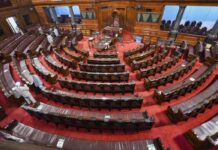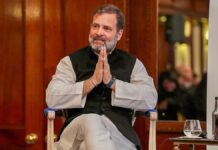X: @the_news_21
The dawn of February 1st in Jharkhand will not herald the presence of a Chief Minister, marking a tumultuous period in the state’s political landscape. Governor C P Radhakrishnan conveyed to the ruling JMM-Congress alliance that he would revert to their proposal to appoint JMM’s Champai Soren as the leader of the legislature party after careful consideration of all legalities. Chief Minister Hemant Soren tendered his resignation to the Governor at Raj Bhavan on Wednesday night, just moments before his arrest by the Enforcement Directorate.
The ruling coalition, comprising JMM, Congress, and RJD, boasts 29, 17, and one MLA respectively. In contrast, the Opposition presents a formidable force with 26 BJP members and three from AJSU. Additionally, the CPI(M-L) and NCP (AP) contribute one MLA each, while two independents add to the mix.
The Governor’s decision to withhold immediate action has sparked concerns within the JMM-Congress camp. Congress MLA Dipika Pandey Singh voiced discontent, alleging that the Governor dismissed their majority and treated them disrespectfully.
Champai Soren, in a letter to the Governor, asserted his claim to leadership, citing unanimous support from alliance members. However, the delay in appointing a successor has raised fears of a looming constitutional crisis among the ruling coalition, with concerns about external interference gaining traction.
Former BJP leader and Independent MLA Saryu Roy took to social media to highlight the gravity of the situation, emphasizing the absence of a Chief Minister or functioning government. He suggested that interim President’s rule might be the only recourse until a new government is formed.
Contrary to these apprehensions, Jharkhand Speaker Rabindranath Mahato reassured that the government would continue to operate seamlessly, dismissing concerns of a threat to majority status. However, the uncertainty surrounding the appointment of a new Chief Minister looms large, with the state’s political future hanging in the balance.
As Jharkhand navigates through this period of political flux, the stakes remain high, and the need for swift resolution becomes increasingly urgent. The coming days will undoubtedly test the resilience of the state’s democratic institutions and the ability of its political leaders to steer the ship through troubled waters.








where can i buy generic clomid no prescription clomid for sale in mexico where to get generic clomid without dr prescription clomid uk buy get cheap clomiphene without a prescription how to buy generic clomiphene no prescription buy cheap clomiphene without dr prescription
With thanks. Loads of knowledge!
More posts like this would prosper the blogosphere more useful.
buy zithromax without prescription – where to buy flagyl without a prescription buy metronidazole 400mg pills
buy rybelsus pill – buy cyproheptadine 4 mg without prescription periactin online buy
motilium 10mg pill – buy motilium without prescription cyclobenzaprine oral
inderal online – clopidogrel 75mg uk buy methotrexate 10mg sale
cost augmentin 375mg – atbioinfo ampicillin cheap
order esomeprazole 40mg sale – anexa mate how to buy esomeprazole
order warfarin 2mg online – https://coumamide.com/ buy cozaar pills for sale
where can i buy mobic – https://moboxsin.com/ mobic online buy
prednisone over the counter – corticosteroid order prednisone 5mg sale
mens erection pills – site buy erectile dysfunction medication
where can i buy amoxicillin – buy amoxil cheap amoxil usa
cialis canadian purchase – https://ciltadgn.com/ snorting cialis
buy zantac 150mg for sale – https://aranitidine.com/ purchase zantac pills
buy cialis online usa – strong tadafl cialis blood pressure
The thoroughness in this draft is noteworthy. viagra 5 mg es suficiente
mail order viagra legitimate – https://strongvpls.com/ buy cheap viagra mastercard
More articles like this would remedy the blogosphere richer. https://buyfastonl.com/gabapentin.html
More text pieces like this would urge the интернет better. https://ursxdol.com/clomid-for-sale-50-mg/
More posts like this would add up to the online space more useful. https://prohnrg.com/product/diltiazem-online/
This is a keynote which is in to my heart… Diverse thanks! Quite where can I lay one’s hands on the acquaintance details for questions? https://ondactone.com/product/domperidone/
This is the description of glad I enjoy reading.
cheap methotrexate 10mg
More posts like this would make the blogosphere more useful. http://www.gtcm.info/home.php?mod=space&uid=1158214
buy generic forxiga online – this order generic forxiga
orlistat pills – janozin.com order orlistat 120mg for sale
The vividness in this serving is exceptional. https://sportavesti.ru/forums/users/fxkwd-2/
You can protect yourself and your dearest by way of being alert when buying prescription online. Some pharmaceutics websites operate legally and put forward convenience, solitariness, bring in savings and safeguards to purchasing medicines. buy in TerbinaPharmacy https://terbinafines.com/product/imitrex.html imitrex
Thanks for sharing. It’s outstrip quality. cozaar pills
This is the type of post I recoup helpful.
Khám phá thế giới giải trí trực tuyến đỉnh cao tại MM88, nơi mang đến những trải nghiệm cá cược thể thao và casino sống động.
Khám phá thế giới giải trí trực tuyến đỉnh cao tại MM88, nơi mang đến những trải nghiệm cá cược thể thao và casino sống động.
Đến với J88, bạn sẽ được trải nghiệm dịch vụ cá cược chuyên nghiệp cùng hàng ngàn sự kiện khuyến mãi độc quyền.